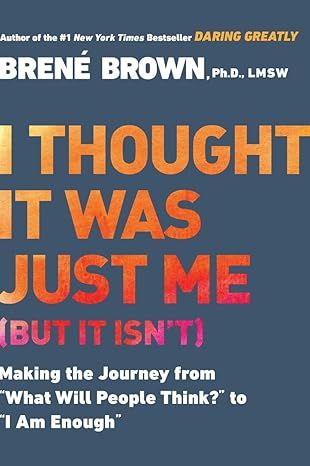I Thought It Was Just Me (but it isn't): Making the Journey from "What Will People Think?" to "I Am Enough"
4.7
-
7,822 ratings
Researcher, thought leader, and New York Times bestselling author Brené Brown offers a liberating study on the importance of our imperfections—both to our relationships and to our own sense of self
The quest for perfection is exhausting and unrelenting. There is a constant barrage of social expectations that teach us that being imperfect is synonymous with being inadequate. Everywhere we turn, there are messages that tell us who, what and how we’re supposed to be. So, we learn to hide our struggles and protect ourselves from shame, judgment, criticism and blame by seeking safety in pretending and perfection.
Brené Brown, PhD, LMSW, is the leading authority on the power of vulnerability, and has inspired thousands through her top-selling books Daring Greatly, Rising Strong, and The Gifts of Imperfection, her wildly popular TEDx talks, and a PBS special. Based on seven years of her ground-breaking research and hundreds of interviews, I Thought It Was Just Me shines a long-overdue light on an important truth: Our imperfections are what connect us to each other and to our humanity. Our vulnerabilities are not weaknesses; they are powerful reminders to keep our hearts and minds open to the reality that we’re all in this together.
Brown writes, “We need our lives back. It’s time to reclaim the gifts of imperfection—the courage to be real, the compassion we need to love ourselves and others, and the connection that gives true purpose and meaning to life. These are the gifts that bring love, laughter, gratitude, empathy and joy into our lives.”
Kindle
$12.99
Available instantly
Audiobook
$0.99
with membership trial
Hardcover
$51.29
Paperback
$8.36
Ships from
Amazon.com
Payment
Secure transaction
ISBN-10
1592403352
ISBN-13
978-1592403356
Print length
336 pages
Language
English
Publisher
Avery
Publication date
December 26, 2007
Dimensions
5.25 x 0.73 x 7.92 inches
Item weight
9.6 ounces
Popular Highlights in this book
Shame is the intensely painful feeling or experience of believing we are flawed and therefore unworthy of acceptance and belonging.
Highlighted by 15,190 Kindle readers
Women with high levels of shame resilience were both givers and receivers of empathy.
Highlighted by 6,191 Kindle readers
People believe they deserve their shame; they do not believe they deserve their humiliation.
Highlighted by 4,692 Kindle readers
Product details
ASIN :
B000SEHDGM
File size :
3573 KB
Text-to-speech :
Enabled
Screen reader :
Supported
Enhanced typesetting :
Enabled
X-Ray :
Enabled
Word wise :
Enabled
Editorial reviews
Review
“Brown offers insights and strategies for understanding shame and overcoming its power over women… An interesting look at a debilitating emotion that stunts the potential of too many women.” —Booklist
“Brown is clearly passionate and knowledgeable about her subject and has a smooth writing style.”
—Library Journal
“Shame is a profoundly debilitating emotion. It drives our fears of not being good enough. We can learn to feel shame about anything that is real about us --- our shape, our accent, our financial situation, our wrinkles, our size, our illness, or how we spend our day. I Thought It Was Just Me is an urgent and compelling invitation to examine our struggles with shame and to learn valuable tools to become our best, most authentic selves. Grounded in exceptional scholarship and filled with inspiring stories, this is one of those rare books that has the potential to turn lives around.”
—Harriet Lerner, Ph.D. author of The Dance of Anger
“Brené Brown has written an insightful and informative study of a subject that leaves many women feeling trapped and powerless. Her analysis of how women are often caught in shame, is in itself liberating, and her thoughtful suggestions will help readers continue to free themselves from emotional debilitation in ways they may not even realize are possible. I Thought It Was Just Me can be a doorway to freedom and self-esteem for many, many readers.”
—Martha Beck, Ph.D., columnist, O, The Oprah Magazine, and author of Finding Your Own Northstar
"Brené Brown’s ability to explore shame and resilience with humor, vulnerability and honesty is both uplifting and liberating. If we want to change our lives, our relationships or even the world, we must start by understanding and overcoming the shame that keeps us silent. This important and hopeful book offers a bold new perspective on the power of telling our stories."
—Professor Jody Williams, 1997 Nobel Peace Prize Recipient; Campaign Ambassador, International Campaign to Ban Landmines
"This is an important and inspiring book that offers understanding and validation to the painful feelings that come with the beliefs that we are not good enough or we should be different than who we are. Brené Brown walks us on a path that releases the shackles of inadequacy and leads us to embracing our authentic selves."
—Claudia Black, Ph.D. author of It Will Never Happen To Me
About the Author
Brené Brown is a research professor at the University of Houston, where she holds the Huffington Foundation–Brené Brown Endowed Chair at the Graduate College of Social Work. She is also a visiting professor in management at the University of Texas at Austin McCombs School of Business. Brown has spent the past two decades studying courage, vulnerability, shame, and empathy and is the author of five #1 New York Times bestsellers: The Gifts of Imperfection, Daring Greatly, Rising Strong, Braving the Wilderness, and her latest book, Dare to Lead, which is the culmination of a seven-year study on courage and leadership. She hosts the Unlocking Us and Dare to Lead podcasts, and her TEDx talk, “The Power of Vulnerability,” is one of the top five most-viewed TED talks in the world with more than 50 million views. She is also the first researcher to have a filmed lecture on Netflix. The Call to Courage special debuted on the streaming service on April 19, 2019. Brené Brown lives in Houston, Texas, with her husband, Steve. They have two children, Ellen and Charlie.
Read more
Sample
Excerpt. © Reprinted by permission. All rights reserved.
INTRODUCTION
When people hear the word shame, they often have one of two responses: “I’m not sure what you mean by shame, but I know that I don’t want to talk about it,” or “Oh, shame. I know it well, but I don’t want to talk about it.” As a shame researcher, I understand our reluctance to talk about it—shame is so powerful that we sometimes feel shame just talking about shame. But after spending six years interviewing hundreds of women about their lives, here’s what I’ve learned: We all experience shame. It is an absolutely universal emotion.
The less we understand shame and how it affects our feelings, thoughts and behaviors, the more power it exerts over our lives. However, if we can find the courage to talk about shame and the compassion to listen, we can change the way we live, love, parent, work and build relationships.
People often want to believe that shame is reserved for the unfortunate few who have survived terrible traumas, but this is not true. Shame is something we all experience. And, while it feels like shame hides in our darkest corners, it actually tends to lurk in all of the familiar places, including appearance and body image, motherhood, family, parenting, money and work, mental and physical health, addiction, sex, aging and religion.
This book offers information, insight and specific strategies for understanding shame and building “shame resilience.” We can never become completely resistant to shame; however, we can develop the resilience we need to recognize shame, move through it constructively and grow from our experiences. Across the interviews, women with high levels of shame resilience shared four things in common. I refer to these factors as the four elements of shame resilience. The four elements of shame resilience are the heart of this book. As we learn more about shame resilience and start to put the elements into practice, we can start to move through the by-products of shame—fear, blame and disconnection—and move toward the courage, compassion and connection we need to live our best, authentic lives.
I’ve dedicated my career to studying shame and its impact on women, men and children. In my study with women, I’ve had the opportunity to interview over three hundred participants of all ages, races, ethnicities and life situations. I’ve also gone back and reinterviewed sixty women who have applied some of the strategies in this book to learn what strategies have been effective and what barriers they’ve faced.
If you’re not sure of shame’s impact on our own life, it may help to read some quotes from my interviews. In these quotes, you can start to see the complex weaving of shame, fear and cultural expectations.
“Sex is such a big issue between me and my husband. Sometimes it’s great. Other times, I’ll start thinking about my body and how much it has changed in the past ten years. I start to feel panicked. I imagine him judging me against these ideals I have in my head. In these moments, I lose it. I’ll pick a fight or do anything to escape and get my clothes back on.”
“One day I was driving down the street in our neighborhood and I stopped next to a car full of young men at a light. They were looking over and smiling. I smiled back and even blushed a bit. Then out of nowhere, my fifteen-year-old daughter, who was sitting in the backseat with her best friend, snapped, ‘Geeez, Mom, stop looking at them. What do you think—they’re flirting with you? Get real!’ I could barely hold the tears back. How could I have been so stupid?”
“When I look at myself in the mirror, sometimes I’m OK. But other times I just see fat and ugly. I get totally overwhelmed—like I can barely breathe. I get sick to my stomach and disgusted. I just want to hide in the house so no one sees me.”
“I’m forty-one and I just went back to school to get my degree. Half of the time I don’t know what they’re talking about—I just sit there and nod my head like an idiot. I feel like a phony—like I’m not smart enough to be there. When these feelings come over me I want to just slip away . . . really, just grab my purse, slip out the back and never go back.”
“My life looks pretty good on the outside. Nice husband, nice house, cute kids—the whole package. On the inside it’s another story. If we didn’t care so much about what other people think, we’d get a divorce. We barely talk to each other. Both of our kids struggle in school. We have to make these outrageous contributions to the school just to make sure they don’t get kicked out. It’s getting harder and harder to keep it all together. Every now and then I know my friends see glimpses of the truth—they have to. It literally makes me sick when I feel like they can see through it all.”
“I constantly feel judged as a mother; like nothing I do is right or good enough. The worst is when other mothers put you down. One disapproving look from another mother can cut me to the core.”
“I don’t tell anyone about the things I’ve gone through—I don’t want them to feel sorry for me or think differently about me. It’s easier to keep my past to myself. Just thinking about being blamed or judged for my past causes me to lose my breath.”
“No one knows how bad things are with my husband—they’d think less of him and less of me for staying with him. I’m constantly lying and making up stories to cover up. When I lie, I feel sneaky and ashamed.”
Sound familiar? For most of us, the answer is yes. Shame is universal. To varying degrees, we all know the struggle to feel comfortable with who we are in a society that puts so much importance on being perfect and fitting in. We also know the painful wave of emotion that washes over us when we feel judged or ridiculed about the way we look, our work, our parenting, how we spend our money, our families or even the life experiences over which we had no control. And it’s not always someone else putting us down or judging us; the most painful shaming experiences are often self-inflicted.
The constant struggle to feel accepted and worthy is unrelenting. We put so much of our time and energy into making sure that we meet everyone’s expectations and into caring about what other people think of us, that we are often left feeling angry, resentful and fearful. Sometimes we turn these emotions inward and convince ourselves that we are bad and that maybe we deserve the rejection that we so desperately fear. Other times we lash out—we scream at our partners and children for no apparent reason, or we make a cutting comment to a friend or colleague. Either way, in the end, we are left feeling exhausted, overwhelmed and alone.
We spend an extraordinary amount of time and energy tackling the surface issues, which rarely results in meaningful, lasting change. When we dig past the surface, we find that shame is often what drives us to hate our bodies, fear rejection, stop taking risks or hide the experiences and parts of our lives that we fear others might judge. This same dynamic applies to feeling attacked as a mother or feeling too stupid or uneducated to voice our opinions.
Until we start addressing the role shame plays, we may temporarily fix some of the surface problems, but we can’t silence the old tape in our head that suddenly blares some version of “something is wrong with me.” For example, that imposter or phony feeling at work or school rarely has anything to do with our abilities, but has more to do with that fearful voice inside of us that scolds and asks, “Who do you think you are?” Shame forces us to put so much value on what other people think that we lose ourselves in the process of trying to meet everyone else’s expectations.
Shame: The Silent Epidemic
When you spend years studying a topic like shame, it is easy to forget how much people dislike and fear the topic. My husband constantly reminds me not to take it personally when people make the “I just smelled something bad” face after I tell them I’m a shame researcher. A couple of years ago, I had a personal experience that taught me a lot about shame and why courage and compassion are so critical to shame resilience.
I was flying to Cleveland to give a lecture at Case Western Reserve University. As I settled into my window seat, a very energetic woman plunked down in the aisle seat on my row. I had seen her in the airport chatting up a storm with other waiting passengers and airline employees. After holding up aisle traffic for the better part of five minutes, she got her bags stuffed under the seat in front of her, turned toward me and introduced herself. We talked for a minute about the Houston weather before she asked, “So what do you do and why are you going to Cleveland?” As the plane took off, I raised my voice a bit and said, “I’m a researcher and I’m going to give a lecture at Case.” “How wonderful,” she responded. “What do you study?” Still fighting against the roar of the engines, I leaned toward her and said, “Women and shame.”
Her eyes widened and she let out an enthusiastic “Oh, wow.” She leaned so far toward me that her entire upper body was perched over the empty seat between us. “Women in chains! That’s so interesting. Tell me more about it.” By this time the airplane was quiet again. I smiled and said, “Not women in chains . . . women and shame.” “Shame?” she asked, in a shocked and disappointed voice. “Yes,” I replied. “I study shame and the various ways it affects women’s lives.”
With that, the conversation was over. She averted her eyes, then told me that she needed to get some rest. For three hours we sat silent in our seats. Every now and then I could feel her looking at me and perusing my laptop screen out of the corner of her eye. The first couple of times, I turned toward her to smile and acknowledge her, but immediately she would pretend to be sleeping. One time she even threw in a little snore, which I knew was fake because she was wiggling her feet the entire time.
When I returned to Houston I had dinner with a colleague who is a violence researcher. I was anxious to tell my “women in chains” story to someone who could relate to the pitfalls of researching a less-than-popular topic. After we laughed about “women in chains” being preferable to women and shame, she confessed that most people are quite interested in her research and she’s normally the one who fakes being asleep on the plane. “I don’t understand,” I said. “These are both serious epidemics. Do people actually think shame is worse than violence?” She thought for a minute then said, “Well, no. They are both serious epidemics, but shame is a silent epidemic. People understand violence and can talk about it. We’re still afraid of shame. Even the word is uncomfortable. You’re studying a topic that people have been taught and socialized not to discuss. It’s as dangerous as violence—but we just keep pretending that it’s not happening.”
I believe my colleague was right—shame is a silent epidemic. It’s a problem of epidemic proportions because it has an impact on all of us. What makes it “silent” is our inability or unwillingness to talk openly about shame and explore the ways in which it affects our individual lives, our families, our communities and society. Our silence has actually forced shame underground, where it now permeates our personal and public lives in destructive and insidious ways. Shame was once largely misunderstood and discounted by social scientists, but now a growing number of researchers and practitioners are examining shame and its role in a wide range of mental and public health issues, including depression, anxiety disorders, addiction, eating disorders, bullying, suicide, sexual assault and all types of violence, including family violence.
Like the growing epidemic of violence, for many, shame has strangely become both a form of self-protection and a popular source of entertainment. Name calling and character assassinations have replaced national discussions about religion, politics and culture. We use shame as a tool to parent, teach and discipline our children. Television shows promising cutthroat alliances, backstabbing, hostile confrontations, exclusion and public humiliation consistently grab the top ratings. And at the same time we use shame to defend and entertain ourselves, we struggle to understand why the world feels so scary, why politics have turned into blood sport, why children are suffering higher levels of stress and anxiety, why popular culture appears to be sinking to all-time lows and why a growing number of us feel alone and disconnected.
As is the case with many epidemics, it seems that we are so mired in our own struggle to take care of ourselves and our families, we just don’t see the connections that allow us to make sense of it and begin to address it as a large-scale problem. We can’t see the enormity of it—we think it’s a personal problem or a self-esteem issue rather than a serious social problem.
To better understand the shame experience, I want you to meet Susan, Kayla, Theresa and Sondra. I had the opportunity to interview them early in my research and again several years later, after they had started putting the shame resilience strategies into practice. Throughout the book, their unfolding stories will serve as important examples of how powerful, and sometimes difficult, it can be to practice courage, compassion and connection.
Susan was in her late twenties when we met. She had been married for three years and had a daughter who had just celebrated her first birthday. Susan had loved her career as a physical therapist but had spent the previous year at home with her baby. As family finances grew tighter, she had decided to return to work part-time. In our interview, she recalled the day when she thought the right job had landed in her lap. She remembered being absolutely ecstatic. Not only had she been offered a perfect part-time physical therapist position, but her church had an open slot for her daughter in their Mother’s Day Out program. Anxious to share her good news, she called her older sister. Rather than congratulating Susan, her sister responded to the news by saying, “I’m not sure why you even had a child if you’re not interested in raising her.” Susan remembers feeling like she had been punched in the stomach. She said, “I could hardly breathe. It was devastating. My first thought was ‘I’m a bad mother.’ By that evening, I was reconsidering the job offer.”
When I interviewed Kayla, she was in her mid-forties and had built a successful career in advertising. She lived alone in large city on the East Coast. Kayla’s father had recently been diagnosed with Alzheimer’s and she was struggling to balance the pressures of her career with her new role as her father’s primary caregiver. She explained that the most difficult issue was dealing with her boss, Nancy. Kayla described Nancy as “the kind of person you never share personal information with.” When I asked her to explain what she meant, she said that Nancy had perfected the art of the personal attack—the more Nancy knew about your life, the more ammunition she had for her arsenal. When Kayla’s mother died two years prior, Kayla struggled with depression. She had confided in Nancy about the depression, only to have Nancy bring it up in front of other colleagues. Kayla said that, despite her fear of Nancy’s attacks, she knew she might miss some work while she looked for a long-term care facility, so she explained her father’s situation to Nancy. Kayla still looked shocked as she described the very first staff meeting she attended after she told her boss. During the meeting, Nancy announced that Kayla was going to be pulled off her current project. Kayla said, “She looked right at me and said to the group, ‘You know Kayla. There’s always some kind of drama.’ ” Kayla describes that moment as “pure paralysis.” “I froze. I felt so small and sliced open. Was Nancy right? Am I a flake? How could I have been so stupid to trust Nancy?”
When I met Theresa she was thirty-five, and had three children ranging from age three to eleven. She described an experience that probably lasted no more than five minutes but, for her, represented one of her greatest struggles. She remembered standing in front of her mirror and feeling extreme anxiety and hatred about her body. She said, “It was one of those days when nothing fit—I had tried on every pair of jeans that I could find.” She said she found herself grabbing at the inside of her thighs and pinching the fat that hung over the side of her bra and chanting, “This is disgusting. I’m disgusting.” She said the entire episode was more stressful because she could hear her kids fighting over the television in the other room while the phone rang off the hook. She started screaming at her kids, “Will someone get the damn phone? I know I’m not the only one who hears it. Damn it!” She finally buried her head in her hands and started sobbing. When she raised her head up she saw her toddler standing a few feet away. He told her in a frightened voice, “I’m sorry Mommy’s sad.” As she stared at him, she was flooded with feelings of shame and self-blame. Theresa told me she would never forget that day and explained, “Sometimes I just get sick of it all—my body, my kids, my house—my entire life. I have these pictures in my head of what I want everything to look like, and it’s never that perfect. I just can’t ever pull it all together. On top of it, I feel so ashamed when I take it out on my kids.”
Sondra, a high school teacher in her mid-fifties, seemed both angry and sad when she told me, “I used to love to debate politics with my brother-in-law. We did it for years. One night when my husband and I were driving home from Sunday dinner, he told me that he hated when I argued with his brother. He told me he had always hated it. He said, ‘Donald is a smart guy. He’s got a master’s degree. I wish you wouldn’t get into it with him.’ Then he told me that I sounded uneducated and stupid and it made him look bad. I became totally withdrawn around his family.”
Are Susan, Kayla, Theresa and Sondra simply struggling from low self-esteem? No. Shame and self-esteem are very different issues. We feel shame. We think self-esteem. Our self-esteem is based on how we see ourselves—our strengths and limitations—over time. It is how and what we think of ourselves. Shame is an emotion. It is how we feel when we have certain experiences. When we are in shame, we don’t see the big picture; we don’t accurately think about our strengths and limitations. We just feel alone, exposed and deeply flawed. My friend and colleague Marian Mankin described the difference between shame and self-esteem this way: “When I think about my self-esteem, I think about who I am in relation to who I want to be, where I come from, what I’ve overcome and what I’ve accomplished. When I feel shame, I’m taken back to this place of smallness where I lose that sense of context. I’m returned to a small place—I can’t see everything else. It’s just a small, lonely place.”
If these stories aren’t about self-esteem, could they simply be about the company we keep? Does Susan just have a mean sister? Is Kayla simply the victim of an insensitive remark? Is Theresa’s struggle with perfection an isolated case? Is Sondra’s husband the only problem? The answer to all these questions is no. If you look at all four of the examples concerning motherhood, work, perfectionism and speaking out, you’ll see that shame is the primary weapon used in these cultural wars.
We are constantly threatening mothers with the shame of “not doing what’s best for their children” or “making selfish or ignorant choices.” Similarly, Kayla’s experience points to the shame culture that has taken over many workplaces. We are expected to produce and keep our professional and personal lives artificially compartmentalized in order to succeed. Her boss’s comment is a product of that culture. Although we’re told (and want to believe), “You are not your job,” the messages from employers, colleagues and the media counter that well-intentioned adage with “You are exactly what you do, how well you do it and what you earn.”
When it comes to Theresa’s struggle, we need to understand that shame is the voice of perfectionism. Whether we’re talking about appearance, work, motherhood, health or family, it’s not the quest for perfection that is so painful; it’s failing to meet the unattainable expectations that lead to the painful wash of shame. Last, Sondra’s story speaks to the power of shame as a social tool that’s often used to keep us quiet. Nothing silences us more effectively than shame.
As you can see, shame is much more than insensitive communicating or a self-esteem issue; it is a basic human experience that is becoming an increasingly divisive and destructive part of our culture. During certain times and in certain situations, we all struggle with feelings of not being good enough, not having enough and not belonging enough. I have found that the most effective way to overcome these feelings of inadequacy is to share our experiences. Of course, in this culture, telling our stories takes courage.
Courage, Compassion and Connection
Courage is a heart word. The root of the word courage is cor—the Latin word for heart. In one of its earliest forms, the word courage meant “To speak one’s mind by telling all one’s heart.” Over time, this definition has changed, and today, we typically associate courage with heroic and brave deeds. But in my opinion, this definition fails to recognize the inner strength and level of commitment required for us to actually speak honestly and openly about who we are and about our experiences—good and bad. Speaking from our hearts is what I think of as “ordinary courage.”
I’m not sure where the term ordinary courage first appeared, but I discovered it in an article on women and girls by researcher Annie Rogers. I think the idea of ordinary courage speaks to the importance of telling our stories. It is especially difficult to practice ordinary courage in today’s culture of shame—a culture full of fear, blame and disconnection. However, practicing the strategies in this book will help all of us reclaim our courage and power; and even start to change the culture.
To understand how shame is influenced by culture, we need to think back to when we were children or young adults, and we first learned how important it is to be liked, to fit in, and to please others. The lessons were often taught by shame; sometimes overtly, other times covertly. Regardless of how they happened, we can all recall experiences of feeling rejected, diminished and ridiculed. Eventually, we learned to fear these feelings. We learned how to change our behaviors, thinking and feelings to avoid feeling shame. In the process, we changed who we were and, in many instances, who we are now.
Our culture teaches us about shame—it dictates what is acceptable and what is not. We weren’t born craving perfect bodies. We weren’t born afraid to tell our stories. We weren’t born with a fear of getting too old to feel valuable. We weren’t born with a Pottery Barn catalog in one hand and heartbreaking debt in the other. Shame comes from outside of us—from the messages and expectations of our culture. What comes from the inside of us is a very human need to belong, to relate.
We are wired for connection. It’s in our biology. As infants, our need for connection is about survival. As we grow older, connection means thriving—emotionally, physically, spiritually and intellectually. Connection is critical because we all have the basic need to feel accepted and to believe that we belong and are valued for who we are.
Shame unravels our connection to others. In fact, I often refer to shame as the fear of disconnection—the fear of being perceived as flawed and unworthy of acceptance or belonging. Shame keeps us from telling our own stories and prevents us from listening to others tell their stories. We silence our voices and keep our secrets out of the fear of disconnection. When we hear others talk about their shame, we often blame them as a way to protect ourselves from feeling uncomfortable. Hearing someone talk about a shaming experience can sometimes be as painful as actually experiencing it for ourselves.
Read more
About the authors
Brené Brown
Dr. Brené Brown is a research professor at the University of Houston, where she holds the Huffington Foundation Endowed Chair at the Graduate College of Social Work. She also holds the position of visiting professor in management at the University of Texas at Austin McCombs School of Business.
Brené has spent the past two decades studying courage, vulnerability, shame, and empathy. She is the author of six #1 New York Times best sellers and is the host of two award-winning Spotify podcasts, Unlocking Us and Dare to Lead.
Brené’s books have been translated into more than 30 languages, and her titles include Atlas of the Heart, Dare to Lead, Braving the Wilderness, Rising Strong, Daring Greatly, and The Gifts of Imperfection. With Tarana Burke, she co-edited the best-selling anthology You Are Your Best Thing: Vulnerability, Shame Resilience, and the Black Experience.
Brené’s TED talk on the Power of Vulnerability is one of the top five most-viewed TED talks in the world, with over 50 million views. Brené is the first researcher to have a filmed lecture on Netflix, and in March 2022, she launched a new show on HBO Max that focuses on her latest book, Atlas of the Heart.
Brené spends most of her time working in organizations around the world, helping develop braver leaders and more-courageous cultures. She lives in Houston, Texas, with her husband, Steve. They have two children, Ellen and Charlie, and a weird Bichon named Lucy.
Read more
Reviews
Customer reviews
4.7 out of 5
7,822 global ratings
T. L. Cooper
5
Shame Weaves Itself Through Life...
Reviewed in the United States on November 18, 2017
Verified Purchase
I've been intrigued with Brené Brown's work since I listened to her Ted Talk on Vulnerability. I finally got around to starting to read her books. I expected I Thought It Was Just Me (But It Isn't): Making the Journey from "What Will People Think?" to "I Am Enough" to be a reiteration of all the things I've heard her say in her talks and classes and in her interviews. It was that but it was also more. In fact, it was more than I expected or perhaps was ready for. I sat down intending to simply read the book and ended up deciding to take her advice and work through the exercises. I didn't always like the answers that arose for me, but it was worth the time it took. I Thought It Was Just Me (But It Isn't) pushed me to examine my thoughts and my attitudes toward shame and blame and vulnerability and strength. I started the book thinking that I'd already done this work, so this would just be me learning more about the topic. Brown breaks down shame and connection in ways that make her points highly relatable and highly relevant. As a writer, I found Brown's research also provides insight into writing characters who are mired in shame and those who aren't. I Thought It Was Just Me (But It Isn't) is a book based on research but written for every human, but particularly women and girls, who have ever been shamed into silence or into roles they didn't want to live.
Read more
177 people found this helpful
by Heather
5
Different. Buy this.
Reviewed in the United States on March 26, 2013
Verified Purchase
Upgraded my DISH package for March Madness and got the OWN channel and saw a commercial for Oprah's Super Soul Sunday interview with Brene Brown, which peaked my interest enough to make me tune in. Typically, I don't buy books Oprah recommends, only because I have found the ones I have read of hers to either be too philosophical for my taste or commericially written/trendy. And I would not have bought this one except when I watched that interviews with Brene Brown - I was very affected by what she was saying and how REAL she was. I was going to order her books even if the reviews were zero stars - based on that interview. I started with this, her first book, and it was what I needed right now and what I needed a hundred times in my life and it's absolutely a game changer for me. I have read The Dance of Anger by Harriet Lerner and I thought that was super powerful - and when I got these books, it was a bonus to see Harriet Lerner raving about the book in its reviews. Much like Lerner's books - this one is timeless. Women in the 50's could have read this and felt the same way I do. Brown states in the beginning that you are going to have feelings when you read this and you are going to be uncomfortable and that was very much the case for me. I keep a journal and I found that when I started reading this I started having all these emotions and feelings and things started taking on a whole new light and I have been journaling what seems like nonstop as I go along in this book. This is the sort of book that you are going to want to go slow through and you will find yourself having AHA moments, and rereading pages over and over again and if you are like me you are going to have to stop and take a breather and process what you are discovering about yourself. To be clear - it's not philosophical, it's not over your head, it's not like A New Earth. :) It's so real, and down.to.Earth that you will want to buy a copy for every person you know. My favorite thing about Brene Brown in her interview was when she said that she didn't want to be a self-helper or a therapist for all her readers - but instead she just wanted to give us words and a vocabulary to better describe and understand what we are feeling. And she absolutely does that.
Read more
86 people found this helpful
O. Merce Brown
5
Fresh, Ground-Breaking, Life-Changing
Reviewed in the United States on March 23, 2007
Verified Purchase
This is an incredible book about a little-discussed subject---shame. Almost painful even to think about, the book comprehensively covers the relationship between women and shame. If you are a woman in America, you should read this book. My copy is highlighted, bookmarked, the spine is cracked and it looks like it's been through a war, but it's just been very well-read and well-used by me.
The subtitle of the book is "Women Reclaiming Power and Courage in a Culture of Shame". The book does not simply diagnose the problem with our culture, but assists women on their individual journey of processing their experiences with shame, and overcoming damage, moving to a better place of power and courage.
Apparently there are currently many shame researchers, but not much has been written about the latest research outside of academic circles. "I Thought It Was Just Me", though research-based, is written for each of us, academic or non-academic, feminist or non-feminist, religious or non-religious, in an approachable, interesting style. The material is somewhat difficult to read only because of the personal issues it triggers; other than that it is very approachable, not dry at all.
The author also discusses changing our culture, one person at a time, with the last chapters addressing how to practice courage, compassion and connection---in a culture of fear, blame and disconnection.
After reading this book I feel more empowered to be me and to stay free of shaming messages. I also feel very convicted and aware of how I have used words and looks to shame others. Of all of the non-fiction books I've read, this one has probably had the most practical impact in my life.
Highly recommended.
Read more
214 people found this helpful
Glen
5
Great book
Reviewed in the United States on March 12, 2024
Verified Purchase
I love the way Dr Brown’s book combined solid research, highly readable stories, vulnerable self-disclosure, and insightful pathways to hope.
3 people found this helpful
C. Fossland
5
Empowering Women Leaders to Embrace Imperfection and Lead with Courage!
Reviewed in the United States on October 2, 2024
Verified Purchase
As a 5-time founder and impact investor, I Thought It Was Just Me (But It Isn’t) by Brené Brown profoundly impacted my leadership journey. This book is the updated, more relatable version of The Road Less Traveled, offering a fresh perspective on vulnerability and courage. Brené’s insights into shedding the armor of perfectionism are invaluable for women founders striving to lead with authenticity. Her research on imperfection as a source of strength resonated deeply, encouraging me to embrace vulnerability and foster genuine connections within my ecosystem. This book is a must-read for visionary women seeking to lead with heart and impact!
Read more
Top Brené Brown titles
View all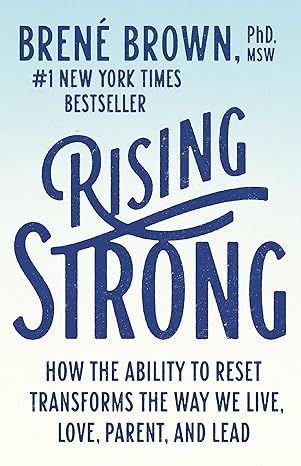
Rising Strong: How the Ability to Reset Transforms the Way We Live, Love, Parent, and Lead
4.7
-
11,216
$0.99
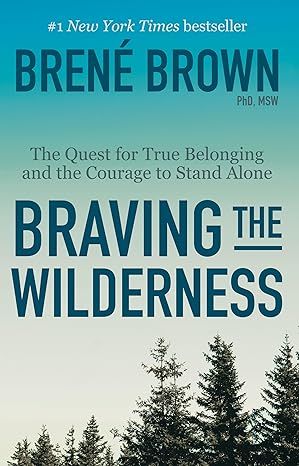
Braving the Wilderness: The Quest for True Belonging and the Courage to Stand Alone
4.6
-
14,403
$0.99
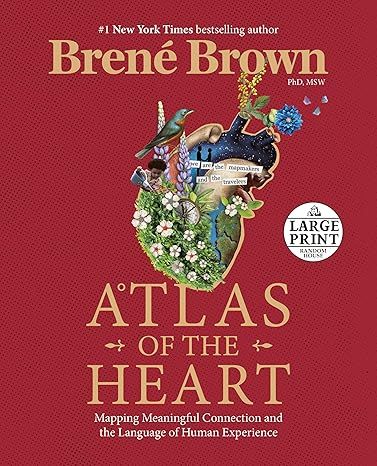
Atlas of the Heart: Mapping Meaningful Connection and the Language of Human Experience (Random House Large Print)
4.7
-
20,467
$0.99
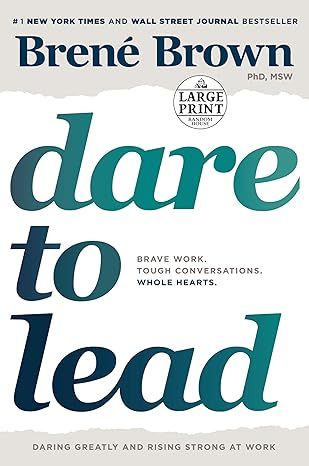
Dare to Lead: Brave Work. Tough Conversations. Whole Hearts.
4.7
-
21,212
$0.99
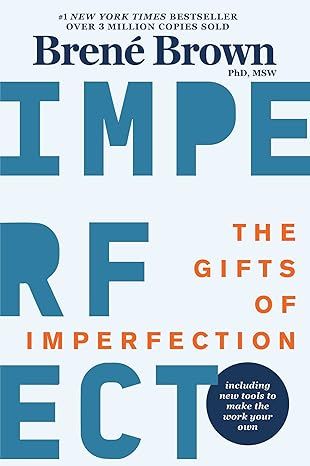
The Gifts of Imperfection: 10th Anniversary Edition: Features a new foreword and brand-new tools
4.7
-
42,318
$0.99
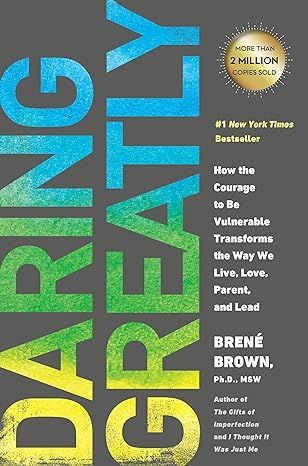
Daring Greatly: How the Courage to Be Vulnerable Transforms the Way We Live, Love, Parent, and Lead
4.7
-
30,025
$4.43
Best Sellers
View all
The Tuscan Child
4.2
-
100,022
$8.39

The Thursday Murder Club: A Novel (A Thursday Murder Club Mystery)
4.3
-
155,575
$6.33

Sapiens: A Brief History of Humankind
4.6
-
140,302
$13.49

The Butterfly Garden (The Collector, 1)
4.3
-
88,556
$9.59

Things We Hide from the Light (Knockemout Series, 2)
4.4
-
94,890
$11.66

The Last Thing He Told Me: A Novel
4.3
-
154,085
$2.99

The Perfect Marriage: A Completely Gripping Psychological Suspense
4.3
-
143,196
$9.47

The Coworker
4.1
-
80,003
$13.48

First Lie Wins: A Novel (Random House Large Print)
4.3
-
54,062
$14.99

Mile High (Windy City Series Book 1)
4.4
-
59,745
$16.19

Layla
4.2
-
107,613
$8.99

The Locked Door
4.4
-
94,673
$8.53
